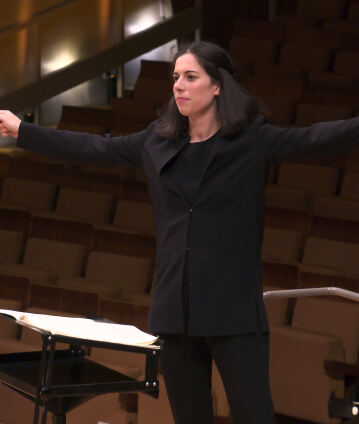“The Golden Twenties”: Marie Jacquot conducts the Karajan Academy

A film that was intended to shock and shake up its viewers: Kuhle Wampe (Empty Stomach) from 1932 depicts the bitter fate of a working-class family during the Great Depression. The music is by Hanns Eisler, who compiled a concert suite with a “best of” selection from the film. Music that was in step with the times: kinetic, exciting, stirring. Kurt Weill’s name is associated first and foremost with the Threepenny Opera. He worked in many different genres, however, as his Violin Concerto and Second Symphony demonstrate.
Creative crises were more or less unknown to Kurt Weill, so his multifaceted oeuvre is impressive, both qualitatively and quantitatively. The list of works of purely instrumental compositions remained short only because Weill concentrated almost exclusively on music theatre in his later Berlin period and then again in American exile. The 1925 Concerto for Violin and Wind Orchestra and the Second Symphony, partly written in exile and premiered in Amsterdam under the direction of Bruno Walter, already represent the composer’s last contributions to absolute music. Both works are on this programme with conductor Marie Jacqot and the scholarship holders of the Karajan Academy. The soloist is Kolja Blacher, who was first concertmaster of the Philharmoniker between 1993 and 1999.
When the previously close and productive partnership with Kurt Weill began to dissolve at the end of the 1920s, Hanns Eisler gradually took the place of Berthold Brecht’s most important musical collaborator. Brecht was involved as a scriptwriter in the early sound film Kuhle Wampe oder: Wem gehört die Welt?, set in the world of the working-classes, with music composed by Eisler. In view of the economic crisis depicted in the film, the score forgoes all despair and sentimentality and uses rhythmic energy to bolster the political awakening evoked by Brecht. The Third Suite of the music from the film performed in this concert ends with an instrumental version of the famous Solidarity Song.
© 2021 Berlin Phil Media GmbH
Related interviews
Artists
Our recommendations
- Kirill Petrenko conducts Tchaikovsky’s “Iolanta”
- Family concert: Christmas with Tchaikovsky’s “Nutcracker”
- Season opening 2024: Kirill Petrenko conducts Bruckner’s Fifth
- Daniel Barenboim conducts Strauss and Carter
- Zubin Mehta and Anoushka Shankar
- Kirill Petrenko conducts Dallapiccola’s “The Prisoner”